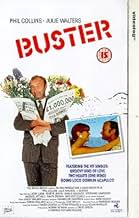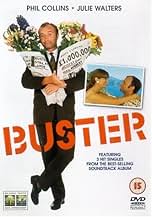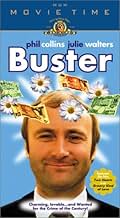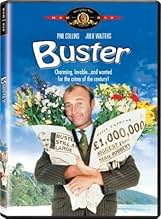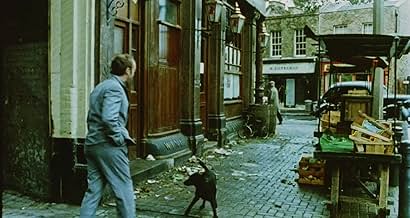IMDb RATING
5.9/10
4.6K
YOUR RATING
Based on the story of Ronald Christopher "Buster" Edwards (Phil Collins), one of the thieves involved in "The Great Train Robbery" of 1963.Based on the story of Ronald Christopher "Buster" Edwards (Phil Collins), one of the thieves involved in "The Great Train Robbery" of 1963.Based on the story of Ronald Christopher "Buster" Edwards (Phil Collins), one of the thieves involved in "The Great Train Robbery" of 1963.
- Nominated for 1 Oscar
- 4 wins & 1 nomination total
- Director
- Writer
- All cast & crew
- Production, box office & more at IMDbPro
Featured reviews
I remember watching Buster one afternoon at High School during the fag end of term time before summer holidays. The opening scene with the dust bin going through the window raise quite a cheer!
Buster is a typical sort of British crime film that is not actually as bad as its detractors will insist, but neither as good as its champions try and tell you. It supposedly recounts the infamous Great Train Robbery of 1963 from the perspective of Ronald 'Buster' Edwards - probably the most well known participants, although not the most important. Just a pity then the planning and execution of 'the job' only takes up about twenty minutes.
The remaining running time, before and after the Robbery, including a fairly lackadaisical police pursuit, and the extended holiday in Mexico, is a dull kitchen sink drama between Phil Collins and his beloved Julie Walters; she's the long suffering wife; he's the lovelable rogue, heart of gold, good family man, lives by 'respect', etc.
In other words, Buster sets the template for any or all of the cheeky chappy Mockney geezers in the endless cycle of runabouts and capers we would see a decade later.
Given the level of talent involved the acting is generally quite good - but it could have been better; Walters's incessant whinging soon grates; Collins isn't bad in the lead role, but he doesn't make much of an impact either. The soundtrack is OK, but overall I'd say Buster was a bit of a chore to sit through.
That the film downplays the violence of the robbery, the critical injuries sustained by train driver Jack Mills, the threats to Post Office staff, and the unsavoury background of the principals - most were professional criminals who did not baulk at using force, and were who were aware of the risks of who they were ripping off - caused great contraversy at the time. Sure, one or two minor members may have been unjustly sentenced, but I'd question how much public sympathy there was for these 'Robin Hoods' when the extent of Mr Mills's ordeal became known.
Try Bank Heist, Thief, The League of Gentlemen or The First Great Train Robbery if you want to see a decent heist movie with a lot more tension and comedy. Compared to these gems, Buster is a bit of a letdown.
Buster is a typical sort of British crime film that is not actually as bad as its detractors will insist, but neither as good as its champions try and tell you. It supposedly recounts the infamous Great Train Robbery of 1963 from the perspective of Ronald 'Buster' Edwards - probably the most well known participants, although not the most important. Just a pity then the planning and execution of 'the job' only takes up about twenty minutes.
The remaining running time, before and after the Robbery, including a fairly lackadaisical police pursuit, and the extended holiday in Mexico, is a dull kitchen sink drama between Phil Collins and his beloved Julie Walters; she's the long suffering wife; he's the lovelable rogue, heart of gold, good family man, lives by 'respect', etc.
In other words, Buster sets the template for any or all of the cheeky chappy Mockney geezers in the endless cycle of runabouts and capers we would see a decade later.
Given the level of talent involved the acting is generally quite good - but it could have been better; Walters's incessant whinging soon grates; Collins isn't bad in the lead role, but he doesn't make much of an impact either. The soundtrack is OK, but overall I'd say Buster was a bit of a chore to sit through.
That the film downplays the violence of the robbery, the critical injuries sustained by train driver Jack Mills, the threats to Post Office staff, and the unsavoury background of the principals - most were professional criminals who did not baulk at using force, and were who were aware of the risks of who they were ripping off - caused great contraversy at the time. Sure, one or two minor members may have been unjustly sentenced, but I'd question how much public sympathy there was for these 'Robin Hoods' when the extent of Mr Mills's ordeal became known.
Try Bank Heist, Thief, The League of Gentlemen or The First Great Train Robbery if you want to see a decent heist movie with a lot more tension and comedy. Compared to these gems, Buster is a bit of a letdown.
Buster has been knocked by critics over the years for being too sympathetic to the real life criminals it portrays, for the love story between Buster Edwards & June and for treating a serious crime as a caper full of cheeky cockneys, chirpy Phil Collin's songs and a comedic light touch afforded by director David Green. This is a shame because as British gangster films go this is very entertaining and well acted with Collins surprisingly engaging in the lead opposite the ever reliable Julie Waters, and with a fine ensemble cast of Larry Lamb, Anthony Quayle, Ralph Brown, Martin Jarvis, Christopher Ellison and Sheila Hancock.
With the Government at the time reeling from the Profumo scandal in the 1960's the Great Train Robbery couldn't have come at a worse time, causing the general public to get on the side of the train robbers who were seen as working class heroes. This is what David Green set out to show with his film by making the characters and situation appealing and getting the audience on their side. If it was a fictional crime caper like The Italian Job that wouldn't be an issue but as this is based on real life events and a victim got killed during the robbery the filmmakers are on shaky ground resulting in this artistic decision backfiring and being lambasted by critics for it. The showing of the film at a Royal Premiere in 1988 was also cancelled due to accusations of it glorifying crime.
While the critics may have had a point I usually put that to one side and enjoy it for what it is, whether it is factually accurate or not, it's still one of my favourite British movies made in the 1980's. Sadly the original negative has been lost so what we are left with is a low grade copy that has since been colour graded several shades of green throughout for reasons only known to the colourist.
Phil Collins well received pop songs especially written for the soundtrack helped the film's general appeal but it is Anne Dudley's score that really drives the film along, especially during the robbery scene. While Phil is no Bob Hoskins, David Green's original choice for Buster, he more than holds his own and I find it surprising he didn't go on to do more high profile acting roles after this one.
With the Government at the time reeling from the Profumo scandal in the 1960's the Great Train Robbery couldn't have come at a worse time, causing the general public to get on the side of the train robbers who were seen as working class heroes. This is what David Green set out to show with his film by making the characters and situation appealing and getting the audience on their side. If it was a fictional crime caper like The Italian Job that wouldn't be an issue but as this is based on real life events and a victim got killed during the robbery the filmmakers are on shaky ground resulting in this artistic decision backfiring and being lambasted by critics for it. The showing of the film at a Royal Premiere in 1988 was also cancelled due to accusations of it glorifying crime.
While the critics may have had a point I usually put that to one side and enjoy it for what it is, whether it is factually accurate or not, it's still one of my favourite British movies made in the 1980's. Sadly the original negative has been lost so what we are left with is a low grade copy that has since been colour graded several shades of green throughout for reasons only known to the colourist.
Phil Collins well received pop songs especially written for the soundtrack helped the film's general appeal but it is Anne Dudley's score that really drives the film along, especially during the robbery scene. While Phil is no Bob Hoskins, David Green's original choice for Buster, he more than holds his own and I find it surprising he didn't go on to do more high profile acting roles after this one.
This is one good movie! This is a good movie for Phil Collins fans such as myself. Phil Collins is not only a great singer and drummer, hes also a great actor. This is a good movie to watch on a Friday night if you don't have anything else to do. You won't be sorry.
Just tracked Buster on DVD (for £4 - bargain, or so I thought, more of that later) and gave it a watch today, to be delighted all over again from the last time I saw it, which must have been a few years ago!
The film manages to capture the essence of the 60s, and delivers it over to the audience, in a style which I thought was very convincing. Don't listen to your friends when they kick up a fuss about seeing this film because it's got Phil Collins in, ignore it, he can act and does very well in the movie. A mention should also be given to the ever dependable Julie Walters, who yet again gives a solid performance.
While on the subject of Julie Walters, I really like the opening scenes in Acapulco (with nice music from Four Tops behind the flying shots over Mexico) as it shows you in an instant that the character of Julie Walters is never going to fit into her environment, as she can be seen wearing dreary colours, a head scalf, thick coat etc and has nothing to match the elegance of the country and it's people. Although Julie Walters can be seen to fit into her forced situation as the scenes in Mexico progress (shown nicely in her choice of clothing I think) you can see she is never really comfortable with it, and her departure back to England was always going to happen.
The film also seems to be accurate to the story of the 63 Great Train Robbery, except for two point, the driver of the train (Jack Mills?) wasn't shown to be as serious hurt as he was by the gang, and Buster also slaps his wife in the Mexico market scene, something the real life Buster has been quoted as saying he would never do, or never did such a thing.
Still don't let this (or the funny (not haha) ending) overshadow your opinion on the movie, truly is a goodun.
Oh and there is a DVD release doing the rounds at the moment, that really is not worth it, as it presents the film in a badly transferred 14:9 image within a 4:3 frame which just looks dull and awful. Go for the proper DVD release in it's glorious 1.85:1 aspect ratio.
The film manages to capture the essence of the 60s, and delivers it over to the audience, in a style which I thought was very convincing. Don't listen to your friends when they kick up a fuss about seeing this film because it's got Phil Collins in, ignore it, he can act and does very well in the movie. A mention should also be given to the ever dependable Julie Walters, who yet again gives a solid performance.
While on the subject of Julie Walters, I really like the opening scenes in Acapulco (with nice music from Four Tops behind the flying shots over Mexico) as it shows you in an instant that the character of Julie Walters is never going to fit into her environment, as she can be seen wearing dreary colours, a head scalf, thick coat etc and has nothing to match the elegance of the country and it's people. Although Julie Walters can be seen to fit into her forced situation as the scenes in Mexico progress (shown nicely in her choice of clothing I think) you can see she is never really comfortable with it, and her departure back to England was always going to happen.
The film also seems to be accurate to the story of the 63 Great Train Robbery, except for two point, the driver of the train (Jack Mills?) wasn't shown to be as serious hurt as he was by the gang, and Buster also slaps his wife in the Mexico market scene, something the real life Buster has been quoted as saying he would never do, or never did such a thing.
Still don't let this (or the funny (not haha) ending) overshadow your opinion on the movie, truly is a goodun.
Oh and there is a DVD release doing the rounds at the moment, that really is not worth it, as it presents the film in a badly transferred 14:9 image within a 4:3 frame which just looks dull and awful. Go for the proper DVD release in it's glorious 1.85:1 aspect ratio.
Singer Collins stars in this simple film about a thief who successfully pulls off the biggest train robbery in history, who then decides to start a new life in Acapulco with his wife June (Walters). Well matched stars in lovely paced yarn with Oscar nominated tunes from Collins ("Two Hearts").
Did you know
- TriviaThe movie was conceived with Bob Hoskins as Ronald Christopher "Buster" Edwards, but the filmmakers decided he'd played that sort of part in Racket (1980) and Mona Lisa (1986). Phil Collins was cast instead after director David Green saw his performance in Deux flics à Miami (1984). David Jason was also considered for the role of Buster at one point.
- GoofsIn the opening scenes, when Buster walks off wearing a new suit he has just stolen, a Vespa P range motor scooter is visible. That model was introduced in 1977.
- Quotes
June Edwards: [when discussing buying a house worth £3,000] You could get a mortgage like other people!
Buster Edwards: Do what?
June Edwards: Borrow it from a bank.
Buster Edwards: Well, I *do* borrow from banks, that is my job.
June Edwards: I mean with their permission
Buster Edwards: I thought you needed a reference to do that,
- Crazy creditsBuster Edwards never got the deal he hoped for. On the 9th December 1966 he was sentenced to 15 years imprisonment for conspiring to rob Her Majesty's Royal Mail Train.
- Alternate versionsThe initial U.S. release of this film had its running time cut from 102 minutes to 94 minutes by its U.S. distributor, Hemdale Films. The subsequent video release by HBO Home Video was based on this edited version, however, a more recent release by MGM Home Video includes the complete film uncut.
- ConnectionsFeatured in Parkinson One to One: Episode #2.7 (1988)
- SoundtracksTwo Hearts (One Mind)
Performed by Phil Collins
Written by Lamont Dozier / Phil Collins
Courtesy of Hit & Run Music Ltd./Buster Films Ltd.
Published by Philip Collins Ltd./Hit & Run Music (Publishing) Ltd./Warner Brothers Music
- How long is Buster?Powered by Alexa
Details
Box office
- Gross US & Canada
- $540,000
- Opening weekend US & Canada
- $265,038
- Nov 27, 1988
- Gross worldwide
- $540,000
- Runtime
- 1h 42m(102 min)
- Color
- Sound mix
- Aspect ratio
- 1.85 : 1
Contribute to this page
Suggest an edit or add missing content


